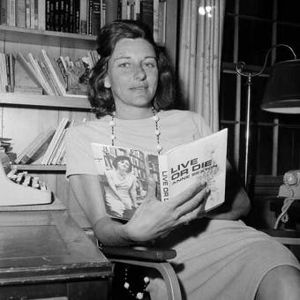 The class met at Boston University on Tuesdays from two to four in a dismal room the shape of a shoe box. It was a bleak spot, as if it had been forgotten for years, like the spinning room in Sleeping Beauty’s castle. We were not allowed to smoke, but everyone smoked anyhow, using their shoes as ashtrays. Unused to classes of any kind, it seemed slow and uninspired to me. But I had come in through the back door and was no real judge. […]
The class met at Boston University on Tuesdays from two to four in a dismal room the shape of a shoe box. It was a bleak spot, as if it had been forgotten for years, like the spinning room in Sleeping Beauty’s castle. We were not allowed to smoke, but everyone smoked anyhow, using their shoes as ashtrays. Unused to classes of any kind, it seemed slow and uninspired to me. But I had come in through the back door and was no real judge. […]
In November I gave him a manuscript to see if he thought “it was a book.” He was enthusiastic on the whole, but suggested that I throw out half of it and write another fifteen or so poems that were better. He pointed out the weak ones and I nodded and I took them out. It sounds simple to say that I merely, as he once said, jumped the hurdles that he had put up. But it makes a difference who puts up those hurdles. He defined the goal and acted as though, good race horse that I was, I’d just naturally run the course.
[…] The last time I saw Mr. Lowell was over a year ago before he left for New York. I miss him as all apprentices miss their first real master. He is a modest man and an incisive critic. He helped me to distrust the easy musical phrase and to look for the frankness of ordinary speech. If you have enough natural energy he can show you how to chain it in. He didn’t teach me what to put into a poem, but what to leave out. What he taught me was taste. Perhaps that’s the only thing a poet can be taught.
_ _ _
from the recollection of Anne Sexton, published under the title “Classroom at Boston University” in Robert Lowell: Interviews and Memoirs, edited by Jeffrey Meyers (University of Michigan Press, 1988)
